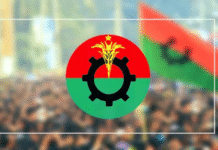Bangabandhu Sheikh Mujibur Rahman frantically telephoned Major General KM Shafiullah, chief of staff of Bangladesh army, when a group of soldiers, heavily armed and backed by tanks and armoured cars, attacked his residence in the pre-dawn hours on August 15, 1975. The Father of the Nation sought Shafiullah’s assistance in warding off the rebels.
In the event, Shafiullah failed to come to his aid. Minutes later, Bangabandhu, his wife, three sons, two daughters-in-law, his brother and others lay dead at Road 32 Dhanmondi in Dhaka. Among the others was his security chief Brigadier Jamiluddin Ahmed, the only individual to have tried coming to the aid of the Father of the Nation. He was murdered as he tried to enter Road 32 after getting a call from Bangabandhu.
Thus did terror seize the country on this day thirty seven years ago. The plotters had done their heinous work meticulously. In the three days preceding the coup d’etat, Khondokar Moshtaque Ahmed, the commerce minister; Taheruddin Thakur, the minister of state for information; Mahbub Alam Chashi, a former government official; and ABS Safdar, chief of National Security Intelligence, met over a series of sessions at Comilla BARD. Early in the morning of August 15, all of them were seen in Dhaka, cheerfully taking over the country.
As many as four hours elapsed after the pogrom at Dhanmondi, good enough time for the army to have acted against the coup leaders. No action came.
Moshtaque took over as president in a clear violation of the constitution. Soon, army chief Shafiullah, air force chief A K Khondokar and navy chief MH Khan would swear allegiance to him.
A cabinet meeting was called, with nearly every minister being present. Some, like the elderly Phani Bhushan Majumdar, were compelled to be there. Phani was seized from PG Hospital, where he was undergoing treatment, and transported to the Bangabhaban.
There is no record of any discussion of the pre-dawn tragedy having taken place. Moshtaque focused on the kind of national dress he thought should be prescribed for the country. He had his own attire in mind.
Once Bangabandhu had been dispensed with, General MAG Osmany, who had bravely resigned from the Jatiya Sangsad in January 1975 in protest against the formation of Baksal, had no qualms becoming Moshtaque’s defence adviser. He would remain in that position till Moshtaque’s ouster three months later.
Justice Abu Sayeed Chowdhury, a former president who had been inducted into the cabinet by Bangabandhu on August 8, was appointed foreign minister in succession to Dr Kamal Hossain, who had been abroad on an official tour and refused to come back home in the new circumstances.
Among those who suddenly found themselves in positions of influence in the Moshtaque cabal were KM Obaidur Rahman, Shah Moazzam Hossain, Nurul Islam Manzur and Taheruddin Thakur.
The new regime, dominated by the majors and colonels who had assassinated Bangabandhu and his family and others, moved swiftly to place vice president Syed Nazrul Islam, former finance minister Tajuddin Ahmed, prime minister M Mansoor Ali and home Minister AHM Quamruzzaman under detention. They were soon carted off to Dhaka central jail, where they were murdered in cold blood on November 3, 1975.
Within a fortnight of the coup, General Shafiullah was replaced as army chief by General Ziaur Rahman, his deputy. Air Vice Marshal AK Khondokar was succeeded by M G Tawab, a religious fanatic and once of the Pakistan air force and living in Germany.
In subsequent years, Shafiullah would serve under Zia and General HM Ershad as ambassador and high commissioner to various countries before eventually joining the Sheikh Hasina-led Awami League and becoming a parliamentarian in 1996.
AK Khondokar too would serve as a diplomat in a number of countries under Zia and Ershad. He joined the latter’s government as a minister and later joined the Awami League under Sheikh Hasina.
It is intriguing to recall what some of the men around Bangabandhu did after his assassination.
Mohammadullah, who served as deputy speaker and then as speaker of the Jatiya Sangsad, took over as the country’s president after Abu Sayeed Chowdhury’s resignation in late 1973. In early 1975, he became a minister in Bangabandhu’s new cabinet. After August 15, he linked up, first, with Moshtaque and then with Zia. He became President Sattar’s vice president only a day before General Ershad ousted the government in a coup on March 24, 1982.
Prof Yusuf Ali, who read out the Proclamation of Independence at Mujibnagar in April 1971 and then served as education minister in Bangabandhu’s government, happily joined Moshtaque. In a later phase, he joined the Bangladesh Nationalist Party (BNP) and was forgotten by the country.
Obaidur Rahman would become part of the BNP and Shah Moazzem would link up with the Jatiya Party and become Ershad’s deputy prime minister. Much later, he would join Khaleda Zia’s BNP.
Another prominent Awami Leaguer, M Korban Ali, minister for information in Bangabandhu’s government, would work closely with Sheikh Hasina before deserting her and joining the Ershad regime.
Abdul Malek Ukil, speaker of the Jatiya Sangsad, told newsmen at London’s Heathrow airport soon after August 15 that Mujib’s overthrow had been the fall of a pharaoh. Senior Awami League politician Mohiuddin Ahmed travelled to Moscow as Moshtaque’s emissary to seek the support of the Soviet leadership for the new regime.
Tofail Ahmed, political secretary to the Father of the Nation, would be arrested by the regime and subjected to indignities. Like him, there were others.
Moulana Abdul Hamid Khan Bhashani welcomed the change-over. Only months earlier, in March 1975, he had welcomed Bangabandhu to his home at Santosh, Tangail, and told him he was on the right path.
Moshtaque, who would go to prison in Zia’s times, died a few months before Sheikh Hasina led the Awami League back to power in 1996. Before his death, in a rambling interview with a weekly journal, he said he had had no hand in Bangabandhu’s killing and that he treated Sheikh Hasina and Sheikh Rehana as his own daughters.
Chashi died in mysterious circumstances in the deserts of Saudi Arabia.
Thakur went to prison over the jail killings of November 1975, was freed, and died sometime later in disgrace.
Osmany would contest the presidential election in June 1978 as a joint opposition candidate, lose to Zia and then form his Janata Party. He died in the early 1980s, in the Ershad period.
The stories could go on and on. Thus have the chronicles of a dark era, tainted with blood and painted in the lurid colours of shame, come down to the country.
Source: The Daily Star










A man is known by the company he keeps, the old proverb goes. What sort of man this BANGABANDU was when he had such selfish, corrupt and so many criminals around him? The people of Bangladesh must be the most stupid people on earth if they really believe that junior military officers were the only people behind the assassination of Mujibur Rahman. No doubt Mujib was a fascist dictator and his daughter must be the most ignorant woman if she thinks that hanging some of those assassins she has punished the murderers and she has no worry for the future.
Mujib is like Lac Walesa; a rebel rouser and was good to overthrow the regimes. But when it came to running the country, he was a faiure. These men are totally opposite of Nelson Mandela. Mujib was much greeider and wanted to consolidate power only in his hands and his family. He paid his price.
I beg to differ with the author that “Moulana Abdul Hamid Khan Bhashani welcomed the change-over. Only months earlier, in March 1975, he had welcomed Bangabandhu to his home at Santosh, Tangail, and told him he was on the right path”. Myself and millions those followed Maulana’s politics can vouch for that if there was one voice of dissent against the misrule of Sk. Mujib, it was Maulana.
In fact, immediately after the formation of BAKSAL, the one party rule, by Sk. Mujib, I happened to have been a privy to a particular observation that Maulana that he made to one of his protagonists in his village home in Santosh that proved later to be so tragically true.
This would have been sometime in February or March of 1975, the post-BAKSAL period when Maulana surrounded by his party workers and many others made this rather astounding and prophetic statement. At that informal gathering when Kazi Zafar, one of his the then party stalwarts expressed his disaapointment at the prevailing situation saying how depressing it had been that there was only one political party, one newspaper, no freedom of expression and thus no democracy in the country.The Maulana who was in a deep thought responded in a rather pensive mood, saying ” I don’t know about press freedom, democracy etc. etc. what worries me is that my taking this step (formation BAKSAL and one party rule) Mujib seems to have kept only one channel open for change of the government”.
How prophetic and tragically truthful Maulana’s observation has been. Within the next few of months of this observation, on August 15, 1975, Sk Mujib along with his family members and close aides faced death in a surgically executed but a morally abhorent act of military coup that changed the government and indeed the political culture of Bangladesh forever! .